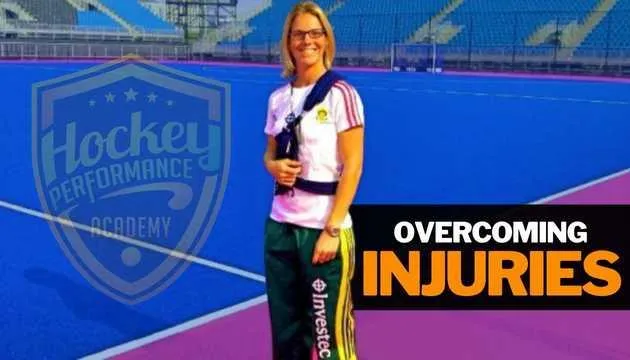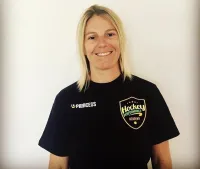
Overcoming Injury In Sport – Is It Such A Bad Thing?
Getting injured is devastating and frustrating…
But maybe it can be a good thing? Even if it doesn’t seem that way.
I have a lot of experience of being injured and have struggled with many different injuries throughout my years of playing sport.
Everything from several shoulder dislocations, shin splints, broken thumb, torn ankle ligaments, hamstring strain, compartment syndrome, frozen shoulder, patella tendonitis to name just a few.
The series of injuries that forced me to stop playing international hockey are the ones that haunt me the most.
For many sport is an outlet to release emotions and those ‘feel good’ endorphins which leave us feeling fantastic, but what happens when we are no longer able to do what we love and we’re left on the sideline?
It can feel like a piece of your identity has been taken away.
How do we deal with a body that doesn’t do what we want it to?
This is something that many fear, whether we realise it or not.
Back when I was training with the national team in Holland in preparation for the Olympic Games, I dislocated my right shoulder the day before selection . My left shoulder had dislocated several times before in the previous 10 years but this was the first time the right went.
From experience I knew it would take at least 6 weeks to get back to playing, let alone be ready to play at the highest level at the Olympics.
I was one of the strongest, fittest and fastest in the team, how could this happen?
After reflecting on it, I realised that this wasn’t an isolated incident. And it wasn’t just physical.
It seems that whenever I was just about to be successful I unconsciously sabotaged myself, often through injury.
The best way to explain this is that despite really wanting to make the team and working hard for it, deep down I doubted whether I was good enough and if I deserved it. When you have these conflicting barriers or beliefs that is when the mind starts to affect the body.
Never underestimate the power of the mind.
What I have learn’t is that under pressure or stress your weaknesses will come to surface, that is why you have to train both your body and your mind, especially if you want to prevent getting injured at crucial times.
Conflicting beliefs that we are often not aware of tend to cause more problems than we realise, but that is a whole other topic.
Overcoming Injury
When you get injured there are different stages that you may go through and there may be different emotions that you feel, such as denial, acceptance, regret, self pity, anger, frustration, etc.
The first step in overcoming an injury is to accept what has happened and realise that nothing will change what has happened. It is easy to say but not always easy to do. But, until you do this you will not be able to move forward.
Injury can be one of the worst or one of the best things that can happen to a sports person.
One of the things I have noticed is that many people focus on what they CAN’T do instead of focussing on what they CAN. It’s easy to feel sorry for yourself, but it’s important that you don’t get stuck in that mindset.
Perhaps a better way of thinking about injuries is what you can do with the extra time you now have or what other area’s of your game you can develop. Just because you can’t be physically active, it doesn’t mean you can’t improve in other ways.
Being injured allowed me to work on things like my mindset, nutrition, core strength, power, vision, tactical understanding, injury prevention, decision making, skills, etc.
After having a shoulder operation I spent a lot of time on the sidelines and I spent more time helping others. It was during this time that I decided I wanted to make a real difference and turned my focus to coaching.

Don’t get me wrong, it was a tough time not being able to play any sport and I had many dark days eating a lot of chocolate out of self pity but I knew I had to do something to help others rather than feel sorry for myself.
With more time on my hands I decided to put everything I learn’t into a training course. My purpose suddenly shifted from being a player to helping and teaching others. That is what led me to setup the Hockey Performance Academy.
The feeling I get now when players share their results and success after working with me is so much better than playing, it makes me realise that being injured was a blessing in disguise.
I’ve not only learn’t valuable lessons during my own experience but now I am able to help others.
When you are injured your focus needs to be on what you have to do to get back onto the field and how you can come back even stronger and better than you were before you got injured.
I have seen many players come back from injury as better players, Anna Flanagan of the Hockeyroos is a prime example of how injury actually made her into a better player. This was because she worked on other parts of her game that she wouldn’t normally have done.
Being injured can be a great opportunity to take a step back and see things from a different perspective. It gives you the time to work on other area’s of your game.
It can be a blessing if you allow it to be.
Enjoy this post?
Get exclusive access to FREE training to help you improve your game.

>> Watch the 4 Steps To Get Noticed in Hockey Training

Overcoming Injury In Sport – Is It Such A Bad Thing?
Getting injured is devastating and frustrating…
But maybe it can be a good thing? Even if it doesn’t seem that way.
I have a lot of experience of being injured and have struggled with many different injuries throughout my years of playing sport.
Everything from several shoulder dislocations, shin splints, broken thumb, torn ankle ligaments, hamstring strain, compartment syndrome, frozen shoulder, patella tendonitis to name just a few.
The series of injuries that forced me to stop playing international hockey are the ones that haunt me the most.
For many sport is an outlet to release emotions and those ‘feel good’ endorphins which leave us feeling fantastic, but what happens when we are no longer able to do what we love and we’re left on the sideline?
It can feel like a piece of your identity has been taken away.
How do we deal with a body that doesn’t do what we want it to?
This is something that many fear, whether we realise it or not.
Back when I was training with the national team in Holland in preparation for the Olympic Games, I dislocated my right shoulder the day before selection . My left shoulder had dislocated several times before in the previous 10 years but this was the first time the right went.
From experience I knew it would take at least 6 weeks to get back to playing, let alone be ready to play at the highest level at the Olympics.
I was one of the strongest, fittest and fastest in the team, how could this happen?
After reflecting on it, I realised that this wasn’t an isolated incident. And it wasn’t just physical.
It seems that whenever I was just about to be successful I unconsciously sabotaged myself, often through injury.
The best way to explain this is that despite really wanting to make the team and working hard for it, deep down I doubted whether I was good enough and if I deserved it. When you have these conflicting barriers or beliefs that is when the mind starts to affect the body.
Never underestimate the power of the mind.
What I have learn’t is that under pressure or stress your weaknesses will come to surface, that is why you have to train both your body and your mind, especially if you want to prevent getting injured at crucial times.
Conflicting beliefs that we are often not aware of tend to cause more problems than we realise, but that is a whole other topic.
Overcoming Injury
When you get injured there are different stages that you may go through and there may be different emotions that you feel, such as denial, acceptance, regret, self pity, anger, frustration, etc.
The first step in overcoming an injury is to accept what has happened and realise that nothing will change what has happened. It is easy to say but not always easy to do. But, until you do this you will not be able to move forward.
Injury can be one of the worst or one of the best things that can happen to a sports person.
One of the things I have noticed is that many people focus on what they CAN’T do instead of focussing on what they CAN. It’s easy to feel sorry for yourself, but it’s important that you don’t get stuck in that mindset.
Perhaps a better way of thinking about injuries is what you can do with the extra time you now have or what other area’s of your game you can develop. Just because you can’t be physically active, it doesn’t mean you can’t improve in other ways.
Being injured allowed me to work on things like my mindset, nutrition, core strength, power, vision, tactical understanding, injury prevention, decision making, skills, etc.
After having a shoulder operation I spent a lot of time on the sidelines and I spent more time helping others. It was during this time that I decided I wanted to make a real difference and turned my focus to coaching.

Don’t get me wrong, it was a tough time not being able to play any sport and I had many dark days eating a lot of chocolate out of self pity but I knew I had to do something to help others rather than feel sorry for myself.
With more time on my hands I decided to put everything I learn’t into a training course. My purpose suddenly shifted from being a player to helping and teaching others. That is what led me to setup the Hockey Performance Academy.
The feeling I get now when players share their results and success after working with me is so much better than playing, it makes me realise that being injured was a blessing in disguise.
I’ve not only learn’t valuable lessons during my own experience but now I am able to help others.
When you are injured your focus needs to be on what you have to do to get back onto the field and how you can come back even stronger and better than you were before you got injured.
I have seen many players come back from injury as better players, Anna Flanagan of the Hockeyroos is a prime example of how injury actually made her into a better player. This was because she worked on other parts of her game that she wouldn’t normally have done.
Being injured can be a great opportunity to take a step back and see things from a different perspective. It gives you the time to work on other area’s of your game.
It can be a blessing if you allow it to be.
Enjoy this post?
Get exclusive access to FREE training to help you improve your game.


